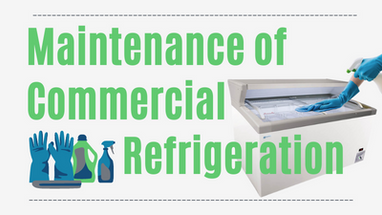Posted by Andrea G on 7th Jul 2022
Maintenance of Commercial Refrigeration
Do you use commercial refrigeration? Imagine the losses to your business if an equipment breakdown were to spoil your stored food or products on display.
The maintenance of commercial refrigeration equipment is essential to guarantee optimal operating conditions in order to maintain its profitability and prolong its lifespan.
Equipment in poor condition generates losses due to poor performance, increases repair costs, and shortens the period in which it is profitable; not to mention the deterioration in the products or materials that you should keep.
Preventive maintenance is a first defense against these losses, since it allows you to detect failures that could affect your profitability if they were missed or occurred unexpectedly.
There is no need to think about catastrophic scenarios, such as having to suspend operations for an indeterminate period due to broken refrigeration equipment. Just imagine the increased consumption of one of the services that weighs the most in the costs of any business: high electricity bills due to inefficient equipment.
What are the best preventative measures to maintain your commercial refrigeration equipment?
These are the best tips to keep your commercial refrigeration unit working in tip-top shape!
- Place the refrigerator and/or freezer away from heat sources such as the stove or dishwasher. Heat sources make these appliances work harder to keep their interiors cool.
- Review and cleaning of door seals in refrigerators and freezers, as well as in the closing system. A piece of paper placed between the door and the appliance should be a bit difficult to remove. If not, consider replacing the gasket.
- Check for air circulation around the vents.
- Maintaining the cleanliness and maintenance of the coils, as they may be exposed to corrosion due to rust or other elements. Cleaning refrigerator condenser coils is something that should be done every 3 months. A soft brush or vacuum attachment can be used on the coils, which are located at the bottom or back of the refrigerator.
- Setting the thermostats in both the refrigerator and freezer to the optimum energy efficient temperature is very important so that you do not consume energy unnecessarily. It is recommended to keep the refrigerator at less than 4°C and the freezer at -18°C, this will keep food fresh for longer and prevent diseases that can be transmitted by food bacteria.
- Exploration for water leaks or drips that could cause mold or oxidation of the parts. Excessive dirt can also cause the drain tubes to become clogged. It is recommended to check the tube every two months to avoid a blockage that causes serious problems. When there is a major blockage in the drain hoses, it causes an overflow in the defrost system that leaks onto the floor. If you notice calcium or water stains on the outside of the hoses, clean them with soap and water to prevent any future wear.
- Verification of the pump filters to remove any residue that could clog it and damage its operation. Grease and dust can be a nuisance to your refrigerator's air filters. Heavy buildup can prevent the air in the unit from being properly ventilated, so routine cleaning is essential. Remove loose dust or debris with a powerful industrial vacuum and use a degreasing solution to remove thick grease. Too much grease and dust can damage the air filter.
- Checking the proper functioning of the water pump itself and the fans. Be sure to wipe off any liquid that collects on the shelves or surface of your scope unit. Too much moisture can cause the refrigerator or freezer to break down over time. Not only should you clean up spills right away, but you should also check for any moisture buildup at least once a week.
Most importantly, set up consistent routine maintenance services of expert personnel who know how the most advanced and profitable commercial restaurant equipment works.
As always, the team at Leasetaurant is happy to answer any further questions you may have.



